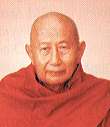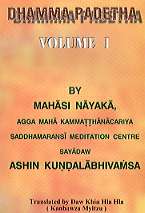| Buddhists use the word saddha liberally
when doing merits. One is praised when one is full of saddha or faith.
"Saddha" which is a Pali word has a deep and wide meaning. Saddha is
the best basic concept for all Buddhists who aspire most to reach total
extinction of being (nibbana). A meritorious deed can be accomplished only
where there is saddha.
"Saddha" is translated as belief or
faith in one single word. In Myanmar language it is a combination of two words
meaning faith and clarity.
There are five kinds of faith
(1) Faith in the Buddha
(2) Faith in the Teachings (Dhamma)
(3) Faith in the Sangha
(4) Faith in the Action (Kamma)
(5) Faith in the effects of Kamrna
Faith or
Confidence
Lord Buddha, whom we revere is perfect with
one realizing the path of holiness (arahatta-magga) insight which could
eliminate all evil. He is entirely free from base, inferior defilements such as
greed (lobha), anger (dosa), delusion (moha).
He is omniscient. Without the help of anyone
He knows everything that should be known. We believe in these excellent
qualities of our Lord Buddha.
We believe that the dhamma we are practising,
beginning from the observing of five precepts up to insight (vipassana)
practice, have been preached by Lord Buddha. If we practise it, we will be free
from all kinds or unhappiness and attain nibbana
We believe that the sangha we revere are
those who are practising dhamma according to the instructions of Lord Buddha to
reach nibbana. They are practising for the benefit of the laity who can do
meritorious deeds, and that their practice is noble.
We believe that the charity (dana), the
wholesome action we are doing, the precepts we are observing concern with our
mind. They cannot be seen with the eye or are tangible. But these will bring
benefit to ourselves.
Because of these wholesome actions, we reap
the benefit of improving our lives in this existence and are free from harm. We
believe that we will get to the higher planes and be endowed with good benefits
in our future existences.
It is also believed that killing, stealing
will bring bad result (akusala kamma). These akusala kamma cannot be seen by
the natural eye but they exist as shadows, giving bad effects as occasion
arises (either in this life or in future existences).
Lucidity or
clarity
When saddha arises in you, things that make
your mind impure such as greed, anger, delusion, pride, conceit, jealousy and
ill-will disappear and your mind becomes lucid. Thus, because it makes your
mind clear and lucid, we say that saddha is clarity.
For example, it is like the ruby of a
Cakkavati, (universal monarch) in ancient times, who ruled over the four
continents. When these monarchs went round the universe, with many followers
sometimes they could not get clear water in some places When that happened, the
monarch's ruby was put into a bowl of muddy water and all at once, the mud
settled to the bottom and the water became clear and drinkable.
In the same way, when one has saddha, lobha,
dosa, moha, pride (mana), jealousy (issa), avarice or stinginess (macchariya),
which are likened to dirt and mud disappear and one's mind is purified. Good
deeds are done in succession.
Because one's mind is clear and lucid one's
behaviour becomes light and active. The facial expression also becomes clear
and lucid. One can vividly observe the donor's courteous activities while
giving dana.
Clarity or
lucidity because of faith
Although saddha is translated into two words,
belief and clarity, the meaning is associated. There is lucidity or clearness
because of faith.
Those who worship Lord Buddha have faith in
Him and His excellent qualities. Thus their minds become pure. Those who
worship the Dhamma or the Teachings of Buddha believe that it will eliminate
unhappiness. Thus their minds become clear and lucid. Those who worship Sangha
also believe in their noble qualities, and their minds become pure. Hence,
belief and lucidity of the mind are associated.
Those who are mindful of the qualities of
Buddha, Dhamma, practising vipassana meditation and mindful of the noble
qualities of Sangha will find for themselves that their minds become pure and
lucid
Disbelief
makes impurity
Sometimes, when evil people like robbers come
to your place you cannot be at peace, your mind is disturbed. What will they
destroy, what will they loot and take with them? How can I escape from these
bad men? You are worried and cannot be at ease because you cannot trust and
believe in these wicked people. Because of lack of faith there is no lucidity
or clarity of mind.
Saddha
likened to the hand
The hand accomplishes the work you wish to
carry out. Likewise, saddha carries out good deeds for you to gain merit.
The hand is most important and most useful
for you. It cleans the body and makes it look presentable. It will help keep
things that are either not valuable, or moderately valuable or the most
valuable such as diamond, gold and other gems. When you wish to get something
you have to take it with your hand.
In the same way, one who gives dana will
never be poor or destitute in every existence. One will have riches and be able
to do meritorious deeds in succession with ease. One gets merit due to saddha,
which is likened to the hand.
Those who have morality (sila), are endowed
with longevity, good health, free from diseases, have pleasant looks, spiritual
and physical happiness, concentration, determination so that they can perform
meritorious deeds in succession. Because they have saddha, they are firm in
their sila. They are able to get merit because of saddha which is likened to
the hand.
Those who are complete with tranquility
(samatha) and vipassana practice, and the belief that they can most rapidly
attain nibbana to which they aspire put in extra effort in practising samatha
and vipassana, and are able to gain merit. To be able to accomplish this, it is
all due to saddha. which is compared to the hand.
Motto: Saddha (faith) is likened to the
hand.
Discard the Outer
Covering, Take the Essence
Those who have not much perfection (parami) or
are immature and blissfully happy in the human abode think many objects to be
valuable, while in essence they are not.
Things that are of no value in
essence.
(1) their property or wealth
(2) their physical bodies
(3) their lives
(Jataka-ttha 4/7)
How it is
thought to be valuable or as essence
(1) Those who have not much parami think that
their gold and diamond, their house and property are depend able and that only
their property will fulfil their social life
(2) When there occurs an accident, they let
their wealth be spent but the physical body must be preserved. The physical
body is more valuable than their wealth.
(3) When their lives are endangered, let the
riches be spent and some parts of the body may be destroyed or impaired but
life must be preserved. Life is more valuable than the riches and the physical
body.
Not seeing it
as the essence
Those who have accumulated parami, like the
Buddha-to-be see things as follows
(1) Their riches and wealth can be destroyed
by floods and storms, by fire, by evil rulers, by robbers and by enemies. They
are not dependable, not lasting and are just the outer covering, not the
essence.
(2) Their physical bodies are full of
diseases and also can be destroyed outwardly by weapons such as swords, spears
and guns any time. Although you may be well today, this month, this year, you
may be bed-ridden the next day, the next month, the next year. That is why your
physical body is not the essence, it is only an outer covering.
(3) The nature of the process of the
phenomena of your physical body and the mind which keep arising and passing
away every moment and they seem to be oppressing you and your whole life can be
destroyed at any time. That is why life is not the essence, it is only an outer
covering.
Take the
essence from the covering.
Those who have accumulated parami like the
Buddhas-to-be would take three kinds of essence from the three objects which
are not the essence.
(1) From the riches, which are not the
essence, they would give dana or charity and gain merit, that is, taking the
essence.
The riches are material objects and can be
destroyed or taken by force by the five kinds of enemies. After giving away or
donating the property, the merit gained cannot be seen by the natural eye, not
tangible and therefore cannot be destroyed by the five kinds of enemies. The
merit gained has the ability to give good effects in a series of existences up
to nibbana and is secure. Therefore, donate as much as possible so as to
extract the �tsence of dana merit from one's property.
Motto: Extract from property, dana
essence.
(2) Extract from the body the essence of sila
merit
The physical body which is prone to the (96)
kinds of diseases internally and can be destroyed outwardly by poisons and
weapons is worthless. But paying obeisance to sangha who have sila, elderly
people, the triple gems, (Buddha, Dhamma, Sangha), teachers and parents and
also looking after them, taking the five, eight, nine precepts are carried out
by the physical body. The merit gained by sila will provide all kinds of
blessings which are secure in the series of existences till one reaches
nibbana. Hence, one observes sila, which has been extracted from the physical
body.
Motto: Extract from the physical body,
sila essence.
(3) From life, which is unsubstantial, take
vipassana merit which is the essence.
While we are alive during Lord Buddha's
Sasana, the merit we gain from practising vipassana meditation is secure and if
circumstances are favourable, the door of woeful states (apaya) will be closed
in this very life and attain nibbana. It is the most secure essence. Therefore,
we must practise vipassana meditation. From the unsubstantial life extract
vipassana essence
Motto: Extract from life, vipassana
essence and merit.
|



